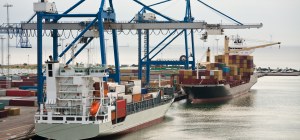What are freeports?

Aaron Nelson Legal Director
The UK government recently launched a consultation on its proposed Freeport policy.
The consultation paper describes Freeports as:
‘innovative hubs which boost global trade, attract inward investment and increase prosperity in the surrounding area by generating employment opportunities’.
The government aims to create up to ten Freeports across the UK and, building on the work done by the Freeports Advisory Panel, is now consulting on the form which these should take.
But what does the government mean by a ‘Freeport’ (capital F, no space)? Why is the government proposing them now, and what opportunities do they offer?
What are free ports?
A free port is an area inside a country, typically around a port or airport, which is legally outside the customs territory of that country. This allows firms to bring goods into the free port, store or process them, and then import them or ‘re-export’ them outside normal tax and customs rules.
Free ports are not a new idea – the ancient Phoenicians had them, and they were the source of wealth for 15th century Hanseatic ports like Hamburg, Bremen and Copenhagen as well as the Renaissance ports of Trieste, Venice and Marseille. Today, both developing and developed countries have revived the idea, with recent success stories claimed in Dubai, Shenzhen, Tangier, Shanghai and in the south eastern ports of the United States.
Essentially, a free port works like this:
- raw materials or semi-finished goods landed at the free port do not incur domestic import duties or taxes, because a different regime applies within the free port area;
- the goods are stored or can be processed within the free port boundary;
- domestic import duties or taxes are only paid (and often at reduced rates) on goods leaving the free port and entering the domestic economy; and
- goods can also be ‘exported’ (out of the free port) without being subject to any domestic export duties which might apply.
The government consultation proposes adding, to this core free port concept of ‘tariff flexibility’, a number of additional elements, designed to be attractive to domestic and international investors looking to start or grow their UK operations, including tax measures to incentivise private business investment, planning reforms to facilitate construction, and infrastructure improvements around free port areas.
Taken together, these measures amount to a ‘Freeport’.
Why now?
The government’s describes Freeports as an example of an opportunity ‘that leaving the EU brings’.
This is true, to an extent. The free ports which existed in the UK during its membership of the EU were of a limited sort, due to the EU’s rules on state aid: the Commission’s view is that tariff exemptions constitute an economic benefit which has a potentially distortive effect on the single market. The only exemptions which the Commission permits are those which can be justified as facilitating regional development, notably the Shannon Free Zone near Shannon airport in Ireland. Now the UK has left the EU – and appears to be rejecting a future relationship based on a ‘level playing field’ (which would involve maintaining existing rules on state aid) – it can develop Freeports as it sees fit. The establishment of Freeports is therefore one way, post-Brexit, of repositioning the UK economy as a more global, open, free-market economy.
An opposing view would be that the UK is swapping membership of one of the world’s largest single markets, with no tariffs on cross-border trade with EU member states, for the imposition of tariffs at its national borders, with free ports merely a limited exception (albeit one that would apply to nations beyond the EU) and that the EU’s rules did not prevent the UK from doing much of what it is now proposing: relaxing planning regulations, investing in improved infrastructure around ports or offering differentiated tax regimes to encourage development.
It is perhaps most revealing that the consultation paper is framed throughout by the UK government’s wider agenda of ‘levelling up’ the UK, driving investment into more deprived communities, increasing employment opportunities and economic activity.
A place apart
The main benefit to traders, manufacturers and processors is that Freeports would sit outside the UK’s normal customs and excise territory.
Under the government’s proposals, goods could be brought into the Freeport, and stored or processed, without tariffs being applied (known as ‘duty suspension’). No tariffs would be payable on goods ‘re-exported’ out of the UK (a ‘duty exemption’). Tariffs would only be applied when the goods are imported into the UK domestic market.
For traders, duty suspension would allow Freeports to avoid the physical, administrative and cultural frictions generated by border crossings – facilitating the international flows of goods and enabling firms to bring more value to global supply chains. The government hopes that Freeports will become ‘national hubs for global trade and investment’ and proposes various ways in which domestic customs declaration processes, controlling the entry of goods into the UK, could be simplified to facilitate this.
The government acknowledges that Freeports would not remove entirely the need for frontier checks, including customs, sanitary, animal welfare or phytosanitary checks. But, in a Freeport, the government proposes that some of these checks would be suspended or relocated away from the port land, where space is at a premium. Due to the need to maintain security and control of the flow of goods into and out of the Freeport, the consultation document acknowledges that the responsibility of some checks will shift away from the importer / exporter to the Freeport operator.
Duty suspension means manufacturers can avoid paying a higher import duty on a raw material, eg oranges, by paying the lower import duty on the processed good, eg orange juice – known as ‘duty inversion’. Normally that would require the juicing facility to be built within the free port boundary but the government’s consultation suggests that ‘potentially’ existing manufacturing plants – car factories, for example – could be designated as Freeports. This particular advantage disappears (at least in terms of domestic imports) if the two duties are (or become) the same.
The provisions for making such changes are already contained in the Taxation (Cross Border Trade) Act 2018, which allows the Treasury to designate ‘any area in the United Kingdom as a special area for customs purposes’. The effect of such designation is to allow goods within the zone to be treated as falling within the storage procedure for customs purposes, permitting a deferral of customs duties.
The 2018 Act also empowers HMRC to make regulations:
‘as to what, or as to the extent to which, other activities may, or may not, be done in the premises or free zones (or elsewhere)’ and also to ‘make any other provision that they consider appropriate for the purposes of import duty in relation to goods kept in free zones’.
The 2018 Act also provides that scope for defining the activities permitted within a zone, such as manufacturing operations that would go beyond the limited forms of ‘processing’ within the storage procedure.
Wider economic benefits
The government’s consultation proposes adding, to the core ‘free port’ concept of ‘tariff flexibility’, a number of additional elements, designed to be attractive to domestic and international investors looking to start or grow their UK operations.
On tax, the government proposes measures to incentivise private business investment based on those applicable in Enterprise Zones, and also seeks views on changes to other taxes: VAT, excise duties, stamp duty land tax, research and development tax credits and national insurance contributions.
The government also proposes planning reforms to facilitate construction and development at Freeports, and wants to encourage local authorities to make greater use of Local Development Orders, which automatically grant planning permission for development in a particular area. It is also consulting on the further planning reforms which would assist potential ‘non-port’ Freeports.
The government wants this concentration of activity within Freeports to generate wider economic benefits. Supporters of free ports point to statistics which show that economic growth within a free port exceeds that outside the boundary. While that is hardly surprising given the preferential business environment within the free port, it does lend weight to the government’s aim for Freeports to ‘re-balance’ the UK economy, away from London-based service industries, by promoting economic activity and growth in major port areas like Grimsby and Immingham, Southampton, Bristol, Hull, the Humber, Liverpool and the Tyne, particularly in those sectors in which the UK is already a market leader: pharmaceuticals, car manufacturing, advanced manufacturing, renewables. The government’s consultation seeks views on how to achieve these wider benefits in terms of business support, growing skills, provision of housing, innovation, research and development.
The concentration of manufacturing or processing in the areas around major ports also seems to make sense from a logistical point of view, given that, as an island nation, 95% of the UK’s physical trade with the world arrives or departs by sea. Recent years have seen the development of large logistical hubs in the vicinity of many of our major ports and airports, in order to increase efficiency in the importation and distribution of goods. Perhaps encouraging manufacturing and processing in the same locations is simply the next logical step.
Any disadvantages?
Historically, the principal disadvantage of free ports has been the reduction in government revenue caused by the exemption of goods from tariffs. Typically, HM Treasury would have weighed that loss of revenue against (claimed) wider economic benefits. Recent (limited) free trade areas in the UK, such as the Port of Liverpool, failed to demonstrate sufficient benefits and their status was removed. However, the UK’s new Chancellor, Rishi Sunak, has been a long-time advocate of free ports, publishing ‘The Free Ports Opportunity: How Brexit could boost trade, manufacturing and the North’ through the Centre for Policy Studies back in 2016, and (as Chief Secretary to the Treasury) one of the signatories on the consultation paper.
But the new Chancellor, and HM Treasury, are also aware that free ports have become associated with money-laundering and tax avoidance. Singapore, Monaco, Luxembourg and Switzerland all have facilities (often conveniently located near private airports) designated as ‘free ports’ which are used to store billions of pounds worth of assets – gold, artworks, wine, antiques, jewellery – to avoid paying import duties. This ‘warehousing’ arrangement was originally intended as temporary, while those goods were in transit, but much is now, in effect, permanent. Sales of goods in such free ports also generally incur no value-added or capital-gains taxes, which means a further loss to government revenues. The consultation paper acknowledges these concerns in Chapter 8 under the heading ‘Preventing illicit activity’, seeking views on the level of risk and how it can be best mitigated.
A further danger is that Freeports may simply encourage existing domestic businesses to relocate, to take advantage of lower costs, but with no overall growth in economic activity. The consultation paper asks only one general question (Q53) on ‘the level of risk of economic displacement’ and, in also asking how the government should mitigate this risk, seems to suggests that the government does not consider the (mitigated) risk to outweigh the potential benefits.
Giving your views
The government proposes that Freeport status be granted following a competitive bidding process and encourages joint applications between public and private sector partners or, at least, local authority support for a private port operator’s application.
Chapter 9 of the consultation paper seeks views on the government’s proposed selection criteria for Freeport operators. Interestingly, these appear to focus on local / domestic matters, such as the proposed form of Freeport governance and delivery, land availability, local leadership, local conditions (eg deprivation and regeneration potential), and not on the applicant’s ability to attract inward investment. Perhaps the government considers that to be its role, or that the form of Freeports it is proposing will be sufficiently attractive without local input.
The consultation closes on 20 April 2020.






